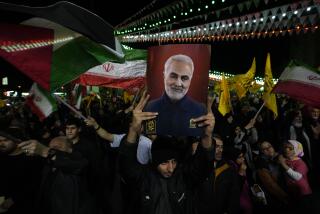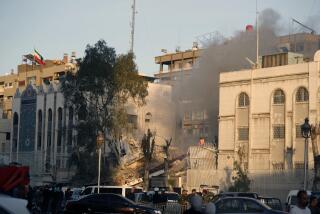Jordan’s king calls on Syria’s Assad to resign
Syrian President Bashar Assad faced heightened economic and political pressures Monday, as Europe imposed a new round of financial sanctions and King Abdullah II of Jordan called on the embattled autocrat to step down.
Meanwhile, the Arab League, which on Saturday moved to suspend Syria because of its failure to implement a league-brokered peace deal, said it was preparing to send a delegation of up to 500 observers into Syria. Details were still being worked out with Damascus, the league’s secretary-general, Nabil Elaraby, told reporters in Cairo.
Syria has said it would welcome Arab League observers, but the Assad regime has remained defiant in the face of Arab demands that it halt violence against civilian protesters.
“The Syrian people should not be worried because Syria is not Libya,” the country’s foreign minister, Walid Moallem, said in a nationally televised news conference.
Moallem’s comments demonstrate how the specter of Libya’s longtime ruler, Moammar Kadafi, and his ultimate fate — ousted by rebels with the help of Western air power and later killed in ignominious fashion — haunts Assad’s administration, which is determined to avoid what it terms “foreign interference” in its crisis.
In a BBC interview, Jordan’s Abdullah became the first Arab leader to say publicly that Assad should resign.
“If Bashar has the interest of his country, he would step down, but he would also create an ability to reach out and start a new phase of political life,” Abdullah said.
The Jordanian monarch — who, like Assad, succeeded his father, in this case the late King Hussein — urged Assad to create a “national dialogue” to facilitate an orderly transition after more than 40 years of Assad family rule. Jordan, a major U.S. ally bordering Syria, has itself experienced scattered protests amid the so-called Arab Spring that has swept the region.
The Syrian uprising began in March near the Jordanian border in the southwestern provincial city of Dara. Opposition activists reported that at least 28 people were killed Monday in that area, some in clashes between armed rebels and security forces at the city’s northern entrance. The official government news agency said at least two law enforcement officers were killed and an unspecified number wounded in clashes with a “terrorist group” in the vicinity of Dara.
The opposition reported at least 50 killed nationwide Monday. The death toll could not be independently confirmed.
On Saturday, the Arab League moved to suspend Syria’s membership in the group after concluding that Damascus had failed to implement the league-brokered peace plan it had signed. The pact mandates that Syria withdraw troops from towns and cities, release prisoners and initiate a dialogue with the opposition.
Foreign Minister Moallem on Monday labeled the league’s decision “a very dangerous step,” reflecting widespread outrage in Syria, a founding member of the 22-nation league. But he did issue an apology for attacks on foreign missions in Syria by pro-Assad loyalists.
Opponents who have demanded Assad’s departure applauded the league’s move as likely to hasten his exit.
Whether the faltering peace plan can be revived remains unclear, though Damascus insists it is committed to the process. Arab ministers gave Syria until Wednesday to demonstrate compliance. A league meeting is scheduled for Wednesday in Rabat, Morocco.
In Brussels, the European Union moved to impose additional economic sanctions, freezing more than a dozen Syrian accounts and suspending development loans from the European Investment Bank. It was the latest round of penalties from Europe, which has already declared an embargo on purchases of Syrian oil. Washington has also imposed sanctions.
Analysts say Syria’s economy is reeling under the combined effects of sanctions, continued unrest, the collapse of its tourism industry and capital flight.
Both Washington and leading Western European nations have called for Assad to step down because of what the United Nations calls a “brutal” crackdown on dissent that has left at least 3,500 people dead since the protests began. Damascus says militant Islamic “terrorists” have killed more than 1,000 security personnel.
The Assad government is determined to make sure that Syria does not become a replay of what happened in Libya, where a Western-led bombing campaign hastened the fall of Kadafi. Western leaders have disavowed any intention to intervene militarily in Syria.
But some officials and human rights groups have pushed for U.N. action to help protect Syrian civilians, perhaps by dispatching international monitors into the country. Damascus is opposed to any U.N. involvement, viewing it as a step toward foreign interference.
It was a U.N. resolution aimed at protecting civilians that provided legal authority for NATO’s bombing of Libya. An Arab League call for a no-fly zone over Libya paved the way for the U.N. action.
The Syrian foreign minister vowed Monday that the “Libyan scenario will not be repeated as there is no justification for repeating it.”
Amro Hassan of The Times’ Cairo bureau contributed to this report.
More to Read
Start your day right
Sign up for Essential California for news, features and recommendations from the L.A. Times and beyond in your inbox six days a week.
You may occasionally receive promotional content from the Los Angeles Times.






